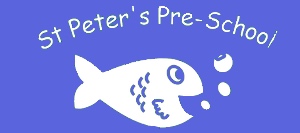Welcome to St. Peter's Pre-School,
Bradfield
EYFS
We follow the Early Years Foundation Stage Curriculum (EYFS) that was revised in October 2024 and has been designed for all children from birth until the end of their reception year in school. The EYFS sets the standards we meet to ensure that children learn and develop well and are kept healthy and safe.
There are 7 areas of learning, all are important and inter-connected but 3 areas are particularly crucial for igniting children’s curiosity and enthusiasm for learning and for building their capacity to learn, form relationships and thrive. The 3 prime areas are:
•Personal, Social and Emotional;
•Communication and Language; and
•Physical Development
The children are supported in the other four areas, known as specific areas, through which the 3 prime areas are strengthened and applied. The specific areas are:
•Literacy;
•Mathematics;
•Understanding the world;
•Expressive arts and design
Communication and language development involves giving children opportunities to experience a rich language environment; to develop their confidence and skills in expressing themselves; and to speak and listen in a range of situations.
Physical development involves providing opportunities for young children to be active and interactive; and to develop their co-ordination, control, and movement. Children must also be helped to understand the importance of physical activity, and to make healthy choices in relation to food.
Personal, social and emotional development involves helping children to develop a positive sense of themselves, and others; to form positive relationships and develop respect for others; to develop social skills and learn how to manage their feelings; to understand appropriate behaviour in groups; and to have confidence in their own abilities.
Literacy development involves encouraging children to link sounds and letters and to begin to read and write. Children must be given access to a wide range of reading materials (books, poems, and other written materials) to ignite their interest.
Mathematics involves providing children with opportunities to develop and improve their skills in counting, understanding and using numbers, calculating simple addition and subtraction problems; and to describe shapes, spaces, and measures.
Understanding the world involves guiding children to make sense of their physical world and their community through opportunities to explore, observe and find out about people, places, technology and the environment.
Expressive arts and design involves enabling children to explore and play with a wide range of media and materials, as well as providing opportunities and encouragement for sharing their thoughts, ideas and feelings through a variety of activities in art, music, movement, dance, role- play, and design and technology.
In your child’s last term you will also receive a report outlining your child’s achievements in all the 7 areas of learning and summarising their time with us. We will share the information that we collect with your child’s next setting or school. These records as all other details about your child will remain confidential between staff, parents and Ofsted inspectors.
School Places: Information can be found on the West Berkshire Council website: westberks.gov.uk/primaryadmissions.


